Ditapis dengan

Trinitas:Bapa, Firman, Roh Kudus
- Edisi
- Cetakan ke-1
- ISBN/ISSN
- 979-21-1203-3
- Deskripsi Fisik
- 130 hlm.; 21 cm.
- Judul Seri
- -
- No. Panggil
- 231 VOR t
- Edisi
- Cetakan ke-1
- ISBN/ISSN
- 979-21-1203-3
- Deskripsi Fisik
- 130 hlm.; 21 cm.
- Judul Seri
- -
- No. Panggil
- 231 VOR t
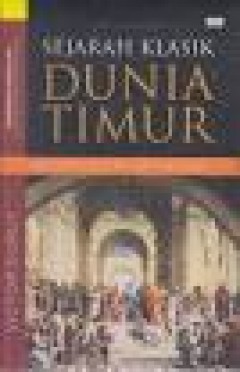
Sejarah Klasik Dunia Timur = Ancient History of the East
Buku ini melacak perkembangan peradaban kerajaan-kerajaan di Cina, India, Mesir, Assyria, Fenisia, Ibrani dan Persia. Ia menyoroti apa saja yang terbaik dan paling berkesan pada masyarakat-masyarakat itu, serta kelemahan mereka dan penyebab kemunduran mereka. Buku ini mengangkat agama Konfusius, Brahma, Buddha dan Zoroaster, yang semuanya, meskipun digambarkan tanpa memihak, jatuh di depan keb…
- Edisi
- Cetakan ke-1
- ISBN/ISSN
- 978-602-0869-99-5
- Deskripsi Fisik
- iv + 316 hlm.; 23 cm.
- Judul Seri
- -
- No. Panggil
- 930 DUR s
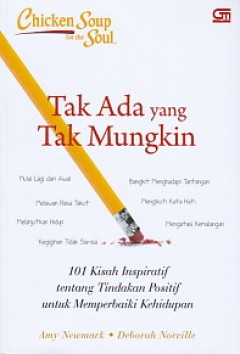
Chicken Soup for the Soul: Tak Ada yang tak Mungkin. 100 Kisah Inspiratif ten…
Kisah-kisah dalam buku ini tentang orang-orang yang tidak ambil pusing terhadap suara negatif di sekitar mereka, yang membuktikan bahwa para pakar pun bisa salah. Mereka terus mencoba dan mengejar semua impian dan kata hati mereka, berusaha menggalinya dengan sekuat tenaga sampai berujung dengan kemenangan-kemenangan yang patut dirayakan—ada yang dahsyat, meski ada pula yang biasabiasa saja. …
- Edisi
- Cetakan ke-3
- ISBN/ISSN
- 978-602-03-3863-7
- Deskripsi Fisik
- xvi + 516 hlm.; 20 cm.
- Judul Seri
- -
- No. Panggil
- 153.2 NEW c

Chicken Soup for the Soul: Kekuatan Berpikir Positif. 100 Kisah Inspiratif te…
Buku ini mengajak pembaca untuk memandang kehidupan dan semua permasalahannya dengan sudut pandang positif. Ketika kita bersikap dan berpikir secara positif, semua permasalahan akan tampak lebih mudah dihadapi. Bahkan, itu akan membuat semangat hidup kita semakin kuat, dan kita dipenuhi rasa syukur dan bahagia karena telah berhasil melaluinya. Buktikan semua kehebatan bersikap dan berpikir p…
- Edisi
- Cetakan ke-10
- ISBN/ISSN
- 978-602-03-0746-6
- Deskripsi Fisik
- x + 484 hlm.; 20 cm.
- Judul Seri
- -
- No. Panggil
- 153.42 CAN c

Kamus Tokoh Indonesia dan Dunia
- Edisi
- Cetakan ke-1
- ISBN/ISSN
- 978-602-70684-07
- Deskripsi Fisik
- vii + 1846 hlm.; ils.; 29 cm.
- Judul Seri
- -
- No. Panggil
- 903 DAG k
- Edisi
- Cetakan ke-1
- ISBN/ISSN
- 978-602-70684-07
- Deskripsi Fisik
- vii + 1846 hlm.; ils.; 29 cm.
- Judul Seri
- -
- No. Panggil
- 903 DAG k
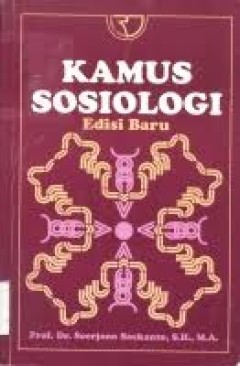
Kamus Besar Ilmu Pengetahuan
- Edisi
- Edisi Lengkap
- ISBN/ISSN
- 979-95157-0-X
- Deskripsi Fisik
- xvi + 1953 hlm.; 29 cm.
- Judul Seri
- -
- No. Panggil
- 503 DAG k
- Edisi
- Edisi Lengkap
- ISBN/ISSN
- 979-95157-0-X
- Deskripsi Fisik
- xvi + 1953 hlm.; 29 cm.
- Judul Seri
- -
- No. Panggil
- 503 DAG k

Budaya dan Masyarakat Laos
Buku ini merupakan kajian komprehensif sosial budaya yang pertama tentang bagian dunia yang mempesona, Laos.
- Edisi
- Cetakan ke-1
- ISBN/ISSN
- 979-3330-25-2
- Deskripsi Fisik
- xxii + 419 hlm.; 23 cm.
- Judul Seri
- -
- No. Panggil
- 305.8599191 BUD b

Model-model Wahyu
- Edisi
- Cetakan ke-1
- ISBN/ISSN
- 979-429-034-3
- Deskripsi Fisik
- 346 hlm.; 21 cm.
- Judul Seri
- -
- No. Panggil
- 231.74 DUL m
- Edisi
- Cetakan ke-1
- ISBN/ISSN
- 979-429-034-3
- Deskripsi Fisik
- 346 hlm.; 21 cm.
- Judul Seri
- -
- No. Panggil
- 231.74 DUL m
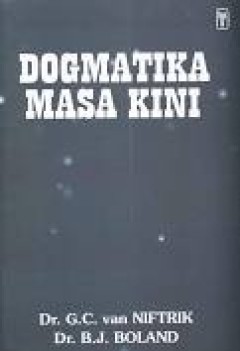
Dogmatika Masa Kini
Dogmatika adalah suatu dalil-ajaran, atau suatu rumusan tentang suatu kebenaran keagamaan. Di dalam Kekristenan, dogmatika adalah bagian dari ilmu teologi yang ada sangkut pautnya dengan isi pengakuan iman Gereja Kristen. Demikianlah buku ini disusun dengan maksud agar pokok-pokok iman Kristen digeluti dengan saksama. Dengan menyebutkan "masa kini" bukan seolah-olah buku ini hendak mengangka…
- Edisi
- Cetakan ke-13
- ISBN/ISSN
- 979-415-194-7
- Deskripsi Fisik
- 576 hlm.; 21 cm.
- Judul Seri
- -
- No. Panggil
- 230 NIF d
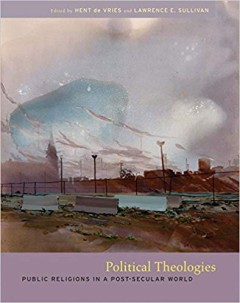
Political Theologies: Public Religions in a Post-Secular World
What has happened to religion in its present manifestations? In recent years, Enlightenment secularization, as it appeared in the global spread of political structures that relegate the sacred to a private sphere, seems suddenly to have foundered. Unexpectedly, it has discovered its own parochialism―has discovered, indeed, that secularization may never have taken place at all. With the “…
- Edisi
- First Print
- ISBN/ISSN
- 978-0-8232-2644-3
- Deskripsi Fisik
- xii + 796 pg.; ils.; 23,5 cm.
- Judul Seri
- -
- No. Panggil
- 201.72 POL p
 Karya Umum
Karya Umum  Filsafat
Filsafat  Agama
Agama  Ilmu-ilmu Sosial
Ilmu-ilmu Sosial  Bahasa
Bahasa  Ilmu-ilmu Murni
Ilmu-ilmu Murni  Ilmu-ilmu Terapan
Ilmu-ilmu Terapan  Kesenian, Hiburan, dan Olahraga
Kesenian, Hiburan, dan Olahraga  Kesusastraan
Kesusastraan  Geografi dan Sejarah
Geografi dan Sejarah